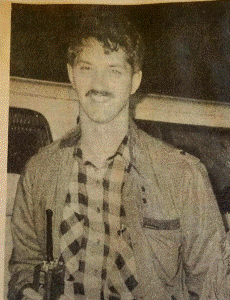Starks started a career in the Allegany County Probation Department in 1982
Read what Starks had to say about the infamous escape of Paul Ceglia
By Andrew Harris, picture of Starks in 1982
Probation is a major component of law enforcement. Many of us, myself included, have run afoul with the law and had to face the consequences. At some point our society realized that people make mistakes and incarceration isn’t necessary, especially for those willing to atone and stay out of trouble. For those who are given a second chance in Allegany County over the last forty years: It has likely been Robert “Bob” Starks making sure the terms of probation are respected, or else.
Because I know I am not alone in having dealt with Mr. Starks, I thought it would be interesting to do a short exit-interview with him. A forty year career, in a pretty rough business, deserves recognition and some insight.
WS: Over the decades you have impacted nearly everyone in the county, directly or indirectly. Give readers a little background information on your career in Allegany County. How did you choose this field? Describe some high and low points…..
RS: I graduated from Whitesville Central School. I attended SUNY-Geneseo for two years and then transferred to Houghton College (now University). I graduated with a B.S. degree in Physical Education. There were not many teaching openings in the early 80’s so I worked for the NYS DOT for a year. Prior to that job, I had visited the Allegany County H.R. Office and I saw a Probation Officer Trainee position Civil Service test posted. I met the qualifications to take the test and did so in 1981. Over a year later, I was canvassed to inquire if I was still interested in the position. I was granted an interview and Probation Director Patty Regan subsequently hired me. I didn’t know if I would last in the job for even two weeks, let alone a forty year career. Probation work was never on my mind until the day I applied to take that civil service test. I truly believe God led me to it and I have never regretted it. My worst day was when I made a foolish decision that potentially could have derailed my career. Thankfully, I learned from that experience and was shown great grace by others. I have had immensely more “best days” in my career but it would be hard to pick out just one. What has brought me great satisfaction though is in doing my part in helping to provide victims restitution for crimes committed against them, and from working with our staff on charitable endeavors for various non-profit organizations in Allegany County.
WS: Describe the Allegany County Probation Department when you started ? How many probates were under supervision then compared to today?
RS: I began my career in August 1982. According to the Department’s 1984 Annual Report (earliest record I have), there was the Director, one Probation supervisor, four Probation Officers, one Probation Officer Assistant, one Account Clerk/Typist, one Senior Typist, and one part-time Typist. At that time, officers either wrote out their reports in longhand or dictated them into a Dictaphone and the support staff typed them on typewriters. The 1984 Report reported the following statistics: 214 completed investigations; 99 Juvenile Delinquency (JD) referrals; 72 Person in Need of Supervision (PINS) referrals; and 286 individuals on probation supervision as of 12/31/83. In comparison, in 2021 the Department’s numbers were 138 completed investigations; 48 JD referrals; 47 PINS referrals; and 255 individuals on probation supervision. These recent numbers are reduced, in part, due to the slower than expected recovery of the Court system from the COVID lockdown.
WS: When your career began, the Allegany County Sheriff’s Department had a working road patrol. That ended many years ago and you’ve been involved with law enforcement before and after the patrol ended. Was that the right choice in hindsight ?
RS: I have never been in the position of having any say regarding whether the County Sheriff’s Office should have a road patrol. I will say, from my experience in Probation, the New York State Police have done an exceptional job of providing police coverage for the County. I also commend the Allegany County Sheriff’s Office for outstanding work in processing our probation violation warrants and arresting the alleged violators.
WS: A large part of your work, and where many have come into contact with you on a professional level, is the Victim Impact Panel, a court mandated event that almost all DWI related offenders must attend.
Today the ignition-interlock device business is booming. Mandatory counseling has created a new industry. Deaths from drunk driving have dropped in half since you started working in probation. At the same time SADD and MADD now seem to be very inactive. Has profit and a new industry helped solve the problem or just changed how we manage it ?
RS: Actually, my involvement in the Victim Impact Panels (VIP)as the Moderator, occurred at most four times a year. So, it is comparatively a small percentage of the work I have been involved in. There was a time when Mothers Against Drunk Drivers (MADD) was quite active in Allegany County and with the VIP meetings. However, as with many organizations, circumstances caused the core members to drop out or move on and no one was there to step into the breach. We did notice that most participants in VIP meetings seemed to be over 30 years of age. It was our hope that the younger people were receiving the message that drinking and driving is a dangerous behavior. It has always been my hope that attendees at the VIP meetings went away having a different outlook on the possible effects of drinking and driving. Leandra’s Law compelling convicted DWI offenders to install Ignition Interlock devices in vehicles registered to them has helped reduce the DWI recidivism rate.
WS: Paul Ceglia was a famous case of home monitoring gone wrong. Could someone pull that sort of escape off again or did Ceglia help rewrite the book on this facet of probation ?
RS: Paul Ceglia was under the supervision of the Federal Probation Office located in Buffalo, NY. I can’t speak to why he was able to pull off what he did as I don’t know what Electronic Monitoring (EM) agency and equipment the Federal Government used. I can say I am confident that the EM agency and their equipment our department utilizes would have provided us much quicker notification of a defendant’s leaving their home so our staff would have been able to respond far sooner.
WS: Between bail reform, home monitoring, remote ignition systems, and future artificial intelligence systems… imagine what this position will be like in 2040….
RS: What will this position look like in 2040? I think this will depend on two major entities. What will the technology be like then and what will the political climate be at that time regarding criminal justice in NYS. I remember in the late 80’s and through the 90’s thinking how much better and more efficient probation work would be if we had a central database that contained our work. Anyone working in the office could look at the case while sitting at their desk and not have to go look up a physical file. The department, in 2006, welcomed such a database system, Caseload Explorer. Probation will have to keep up with future technological changes to stay relevant. However, I certainly hope the human element of face-to-face contact is never replaced. In my opinion, the extent of NYS Bail Reform has not been positive for victims or even for some offenders. If NYS goes in the direction, it has recently, there may come a time when the politicians think no one needs to be held accountable for their actions and probation may not be needed. I hope not. However, I think the citizens are going to cry out for some sort of a return to previous bail policies. If this pendulum shift happens, probation dispositions may increase to levels we haven’t seen in a few years.
WS: What will retirement look like for you? Have you been formulating a “bucket list” in your final days on the job ?
RS: My wife and I are working on remodeling our home. That will keep me busy in the short term. I officiate basketball games in the winter and hope to do so again this season. I am involved in our church. I co-facilitate Fatherhood Connection groups. I hope to get out on the golf course more than I have been able to. We want to travel. I plan to eventually seek volunteer opportunities as I feel I still have some years left in me to serve others.
WS: Thanks Bob for the interesting take on your career as you head back to “private-life.” If you know Bob, or just recognize him, say thank you for his many years serving the county and wish him four decades of happy retirement!!!








